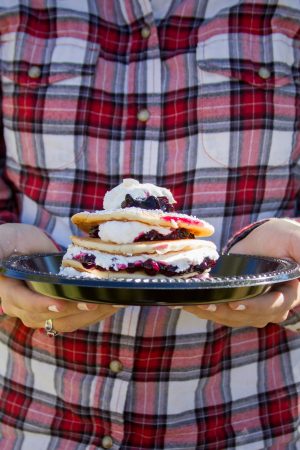By now I’m sure you all know that college is stressful and it has only been one week. The amount of presentations, papers and exams professors expect us to do in the course of 16 weeks is overwhelming!
During undergrad I would often result to comfort foods during times of stress as a way to make me feel better, or so I thought it would. Some might call this emotional eating. I had a desire to eat in response to positive and negative situations.
 Just got dumped? Drown your sorrows in a tub of ice cream.
Just got dumped? Drown your sorrows in a tub of ice cream.
Got an A on your midterm? Celebrate with a pizza.
Experiencing loneliness? That bag of chips is always there.
It’s not that emotional eating is bad or that you’re bad for eating when emotions arise.
Instead of shaming yourself into oblivion, get curious.
First, see if you can name the emotion. What am I feeling right now, exactly? What is the best way I could take care of myself in this moment?
Sometimes food is just the right form of self-care. And other times, there might be another coping tool that works better in that moment. Here are just a few ideas:
- Try a yoga class to help harmonize your thoughts and think through your situation.
- Call up one of your friends for advice.
- Take a nap, your brain probably needs the rest more than you think.
- Give back and volunteer at an animal shelter. Not only will you feel good but you’ll be able to sneak a few cuddles.
- Connect with nature by going on a hike or going for a bike ride.
And sometimes, it’s ice cream, or some chips. It just is sometimes. And that’s ok. When we experience guilt for eating in response to emotions, we basically add in a new emotion to the mix – shame. Shame doesn’t motivate, it simply keeps us stuck in an emotional tail spin.
Here are some things to tell yourself when you’re experiencing emotion and you’re headed for the kitchen:
- I could eat right now. It might be the best way to take care of myself in this moment.
- What is the emotion I’m experiencing?
- What has seemed to help in the past when I experienced this same emotion?
- What’s the best way I could take care of myself given my time and resources?
- Then do that – it might be food, it might be a walk, it might be a nap.
- Once you’ve participated in that self-care activity, ask yourself (with a heaping dose of self-compassion and non-judgment): Did it help? Would I do it that way if I had to do it over again?
Self-compassion is your best friend on emotion-filled days. And there will be many of them this semester.
If food and emotions ever feel overwhelming and complicated, meet with a UCAN health coach. We can help you explore patterns and emotions so that you can find peace in your relationship with food.
 Sarah Neville, Health Coach
Sarah Neville, Health Coach